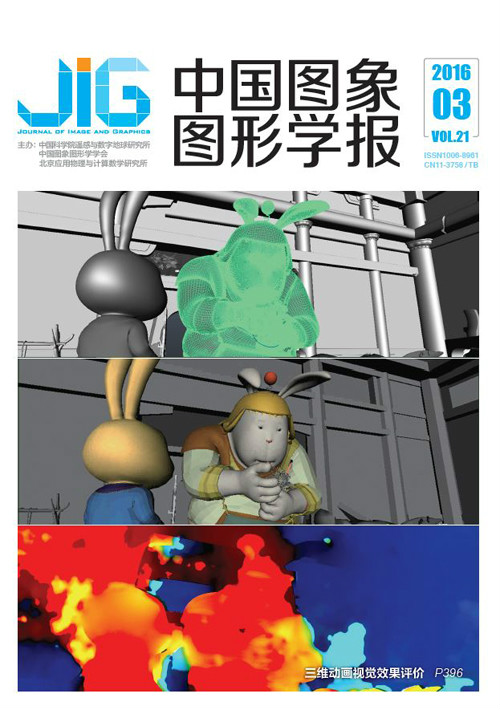
利用Voronoi协方差矩阵重建隐式曲面
李国俊1,2, 朱光耀3, 李宗春1, 李伟1, 孙元超1(1.信息工程大学地理空间信息学院, 郑州 450052;2.卫星导航定位总站, 北京 100094;3.中国人民解放军 68310部队, 西安 710600) 摘 要
目的 针对含少量离群点的噪声点云,提出了一种Voronoi协方差矩阵的曲面重建方法。方法 以隐函数梯度在Voronoi协方差矩阵形成的张量场内的投影最大化为目标,构建隐函数微分方程,采用离散外微分形式求解连续微分方程,从而将曲面重建问题转化为广义特征值求解问题。在点云空间离散化过程中,附加最短边约束条件,避免了局部空间过度剖分。并引入概率测度理论定义曲面窄带,提高了算法抵抗离群点能力,通过精细剖分曲面窄带,提高了曲面重建精度。结果 实验结果表明,该算法可以抵抗噪声点和离群点的影响,可以生成不同分辨率的曲面。通过调整拟合参数,可以区分曲面的不同部分。结论 提出了一种新的隐式曲面重建方法,无需点云法向、稳健性较强,生成的三角面纵横比好。
关键词
Using the Voronoi covariance matrix to reconstruct implicit surfaces
Li Guojun1,2, Zhu Guangyao3, Li Zongchun1, Li Wei1, Sun Yuanchao1(1.Institute of Geography Space Information, Information Engineering University, Zhengzhou 450052, China;2.Satellite Tracking and Locating Terminal Station, Beijing 100094, China;3.PLA Troop 68310, Xi'an 710600, China) Abstract
Objective Many implicit surface reconstruction methods mainly focus on coping with noisy point cloud, but hardly with outliers. Implicit surface reconstruction methods generally require that a point cloud normal is accurate and oriented. However, normal estimation itself is a complex problem for a point cloud with defects laden, such as noises, outliers, low sampling, or registration errors. Hence, a new implicit surface reconstruction algorithm using Voronoi covariance matrix is proposed Method Poisson surface reconstruction with an indicator function (defined as 1 at points inside the model and 0 at points outside)is used to represent the reconstructed surface. The oriented point samples can be viewed as samples of the gradient of the indicator function of the model. The problem of computing the indicator function is reduced to finding the scalar function, whose gradient best approximates a vector field defined by the samples. Poisson surface reconstruction is robust to noises, even with a few outliers. However, it requires point cloud with oriented normal. The Voronoi covariance matrix can be computed by integrating the domain of its Voronoi cell. The eigenvector of the largest eigenvalues of the Voronoi covariance matrix adequately approximates a normal surface. The anisotropy of the Voronoi cell, which represents the confidence of normal estimation, is the ratio between the largest and the smallest eigenvalues. TheVoronoi covariance matrix is used in this study instead of point cloud normal to avoid the difficulty of normal estimation based on Poisson surface reconstruction. The differential equation of implicit function is also formulated, which satisfies the requirement that the function gradient must be aligned with the principal axes of the Voronoi covariance tensor field. The differential equation is solved in a discrete exterior form. As a result, the surface reconstruction problem is reduced to a generalized eigenvalue problem. Cholesky factorization of TAUCS library and Arnoldi iteration of ARPACK++ library are employed to solve the generalized eigenvalue problem of sparse and symmetrical matrices. When dividing point cloud space, the length of the shortest tetrahedral edge is limited to avoid local space excessive division. The thin shell around the point cloud, which is defined by probability measure theory, is further divided to increase surface reconstruction accuracy. Delaunay refinement is used to extract isosurface. Compared with the traditional marching cube method, Delaunay refinement guarantees that reconstructed surface is homotopic to implicit surface and is more flexible in terms of resolution. Result Experiments show that our algorithm can reconstruct the surface well from point cloud even with noises and outliers. Triangle mesh of different resolutions can be generated by adjusting the Delaunay refinement parameter. The fitness between reconstructed surface and point cloud is related to the fitness parameter, and different parts of the surface can be distinguished by adjusting the fitness parameter. However, the bottleneck of the algorithm lies in the high memory requirement and time-consuming Cholesky factor for large models. Conclusion A new implicit surface reconstruction method using Voronoi covariance matrix is presented. Results show that the algorithm is practical and can robustly reconstruct surfaces with good aspect ratioand without point cloud normal.
Keywords
Voronoi covariance matrix discrete exterior calculus probability measure Delaunay refinement surface reconstruction
|



 中国图象图形学报 │ 京ICP备05080539号-4 │ 本系统由
中国图象图形学报 │ 京ICP备05080539号-4 │ 本系统由